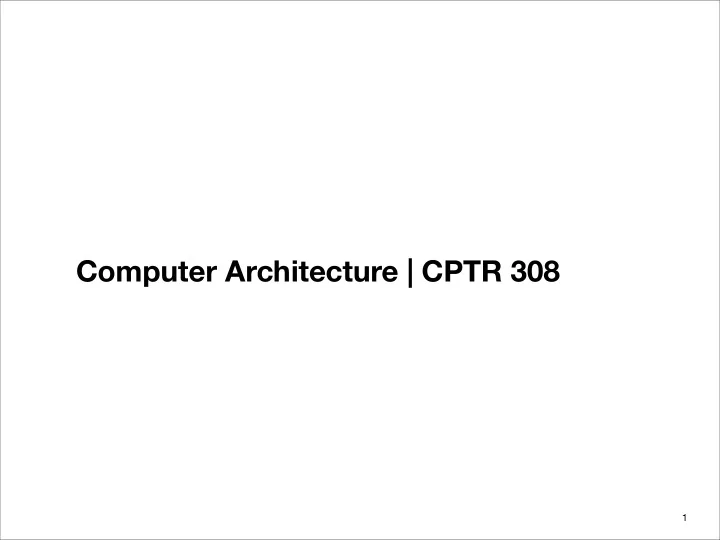

Computer Architecture | CPTR 308 1
Preliminaries • Me: Raheel Ahmad • Ph.D., Southern Illinois University • M.S., University of Southern Mississippi • B.S., Zakir Hussain College, India • Contact: Science 116, rahmad@manchester.edu, 982-5314 • Tues: 9:00 - 12:00 am; Thu: 10:00 - 12:00 am • Email me with subject starting with CPTR308 • http://users.manchester.edu/Facstaff/RAhmad/classes/308/index.htm • Also, Angel’s course webpage has a link to above
Preliminaries • Course schedule • Science 142, MWF: 11:00 - 11:50 am • Computer Architecture • Crucial • Insightful • Challenging • Discuss problems early, often • Assignments, quizes, tests • Keep up to date with the deadlines and due dates
Introduction • This course is all about how computers work • But what do we mean by a computer? – Different types: desktops, servers, embedded devices – Different uses: automobiles, graphics, finance, genomics… – Different manufacturers: Intel, Apple, IBM, Microsoft, Sun… – Different underlying technologies and different costs! • Analogy: Consider a course on “automotive vehicles” – Many similarities from vehicle to vehicle (e.g., wheels) – Huge differences from vehicle to vehicle (e.g., gas vs. electric) • Best way to learn: – Focus on a specific instance and learn how it works – While learning general principles and historical perspectives 4
Number of different types of processors sold
Sale of microprocessors by architecture
Objectives • Study • how do Java/C++ programs execute? • the interface between s/w & h/w • what determines program performance & how to improve it • techniques for improving hardware performance
What is a computer? • Components: – input (mouse, keyboard) – output (display, printer) – memory (disk drives, DRAM, SRAM, CD) – processor • Our primary focus: the processor (datapath and control) – implemented using millions of transistors – Impossible to understand by looking at each transistor – We need... � � � 8
Abstraction • Delving into the depths reveals more information • An abstraction omits unneeded detail, helps us cope with complexity What are some of the details that appear in these familiar abstractions? 9
How do computers work? • Need to understand abstractions such as: • Applications software • Systems software • Assembly Language • Machine Language • Architectural Issues: i.e., Caches, Virtual Memory, Pipelining • Sequential logic, finite state machines • Combinational logic, arithmetic circuits • Boolean logic, 1s and 0s • Transistors used to build logic gates (CMOS) • Semiconductors/Silicon used to build transistors • Properties of atoms, electrons, and quantum dynamics 10 • So much to learn!
Recommend
More recommend